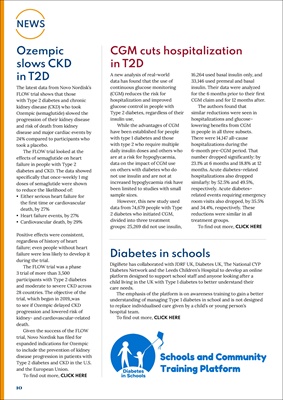
10
NEWS
Ozempic
slows CKD
in T2D
The latest data from Novo Nordisk's
FLOW trial shows that those
with Type 2 diabetes and chronic
kidney disease (CKD) who took
Ozempic (semaglutide) slowed the
progression of their kidney disease
and risk of death from kidney
disease and major cardiac events by
24% compared to participants who
took a placebo.
The FLOW trial looked at the
effects of semaglutide on heart
failure in people with Type 2
diabetes and CKD. The data showed
specifically that once-weekly 1 mg
doses of semaglutide were shown
to reduce the likelihood of:
• Either serious heart failure for
the first time or cardiovascular
death, by 27%
• Heart failure events, by 27%
• Cardiovascular death, by 29%
Positive effects were consistent,
regardless of history of heart
failure; even people without heart
failure were less likely to develop it
during the trial.
The FLOW trial was a phase
3 trial of more than 3,500
participants with Type 2 diabetes
and moderate to severe CKD across
28 countries. The objective of the
trial, which began in 2019,,was
to see if Ozempic delayed CKD
progression and lowered risk of
kidney- and cardiovascular-related
death.
Given the success of the FLOW
trial, Novo Nordisk has filed for
expanded indications for Ozempic
to include the prevention of kidney
disease progression in patients with
Type 2 diabetes and CKD in the U.S.
and the European Union.
To find out more, CLICK HERE
Diabetes in schools
DigiBete has collaborated with JDRF UK, Diabetes UK, The National CYP
Diabetes Network and the Leeds Children's Hospital to develop an online
platform designed to support school staff and anyone looking after a
child living in the UK with Type 1 diabetes to better understand their
care needs.
The emphasis of the platform is on awareness training to gain a better
understanding of managing Type 1 diabetes in school and is not designed
to replace individualised care given by a child's or young person's
hospital team.
To find out more, CLICK HERE
CGM cuts hospitalization
in T2D
A new analysis of real-world
data has found that the use of
continuous glucose monitoring
(CGM) reduces the risk for
hospitalization and improved
glucose control in people with
Type 2 diabetes, regardless of their
insulin use,
While the advantages of CGM
have been established for people
with type 1 diabetes and those
with type 2 who require multiple
daily insulin doses and others who
are at a risk for hypoglycaemia,
data on the impact of CGM use
on others with diabetes who do
not use insulin and are not at
increased hypoglycaemia risk have
been limited to studies with small
sample sizes.
However, this new study used
data from 74,679 people with Type
2 diabetes who initiated CGM,
divided into three treatment
groups: 25,269 did not use insulin,
16,264 used basal insulin only, and
33,146 used premeal and basal
insulin. Their data were analyzed
for the 6 months prior to their first
CGM claim and for 12 months after.
The authors found that
similar reductions were seen in
hospitalizations and glucoselowering
benefits from CGM
in people in all three subsets.
There were 14,147 all-cause
hospitalizations during the
6-month pre-CGM period. That
number dropped significantly: by
23.1% at 6 months and 18.8% at 12
months. Acute diabetes-related
hospitalizations also dropped
similarly: by 52.5% and 49.5%,
respectively. Acute diabetes-
related events requiring emergency
room visits also dropped, by 35.5%
and 34.4%, respectively. These
reductions were similar in all
treatment groups.
To find out more, CLICK HERE